While everybody waits to see if the government-backed debt exemption leads to the Supreme Court potentially invalidating the Telephone Consumer Protection Act (TCPA) entirely, a district court somewhat surprisingly decided to enforce that same debt exemption.
In Tillman v. Navient Sols., LLC, No. 18-CV-04625, 2020 U.S. Dist. LEXIS 104533 (N.D. Ill. June 15, 2020), the plaintiff had defaulted on a consolidated student loan after ten years of making payments. He sued his loan servicer, Navient Solutions, and the loan guarantee agency, United Student Aid Funds, for TCPA violations stemming from their collection efforts.
The court ultimately did not find the plaintiff’s arguments to be compelling, dismissing them with prejudice. However, the court’s rationale for doing so is very surprising: they concluded that the plaintiff’s claims were invalid due to the TCPA’s exemption for government-backed debt, writing that the “loans in question are guaranteed by the United States, which means that even if the defendants used an automatic dialing system or prerecorded or artificial voice in their attempts to collect on the plaintiff’s debt, those efforts were exempt from TCPA restrictions.”
This is, of course, the same debt exemption that the Fourth Circuit severed from the TCPA last year, in the case that eventually went before the Supreme Court as William P. Barr, et al. v. American Association of Political Consultants, et al. And, after hearing oral arguments in that case last month, the Supreme Court’s ruling is expected any day now. Many observers have posited that SCOTUS may invalidate the TCPA entirely due to the almost certainly unconstitutional debt exemption. Bur the Northern District of Illinois Court is still invoking that exemption during this limited period of time while it can still be in effect.
This is an unusual decision, at the very least.





